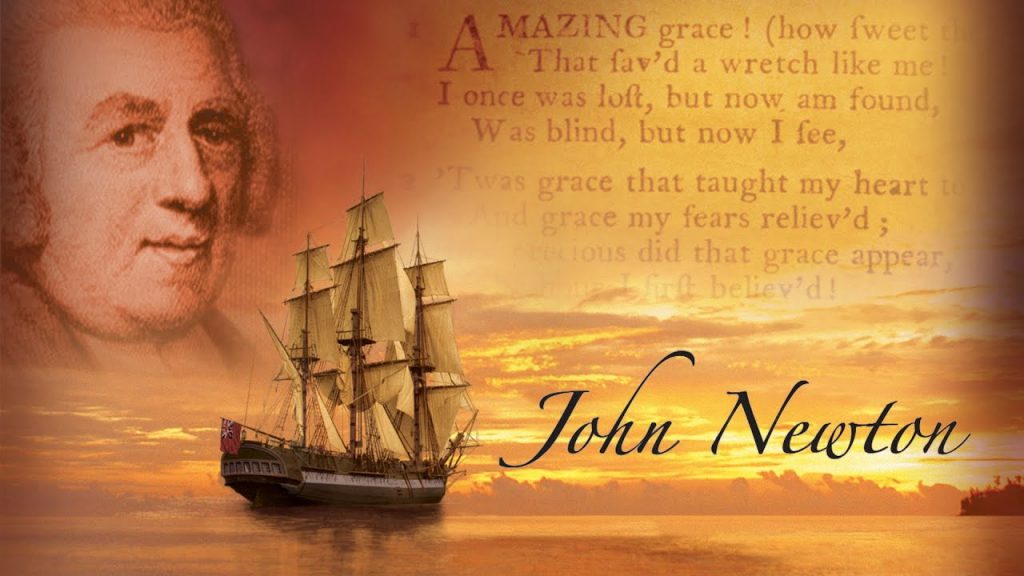
To listen to today’s reflection as a podcast, click here
Every day during this season of Lent we’re looking at the miracles of Jesus – his spectacular displays of supernatural power that are reported in the Gospels.
A near disaster at sea transformed one man’s life.
And that ended up changing both music history and spiritual history.
On May 10, 1748, the wooden frigate Greyhound – built to transport Africans to the New World, where they would live out the rest of their lives as slaves – was caught in a violent storm off the coast of Ireland. As wave after wave broke over the decks, its 23-year-old captain, John Newton, screamed into the wind, “God, have mercy!”
This was decidedly out of character for Newton, who freely acknowledged he had no serious spiritual convictions.
When the storm began to die down, Newton concluded his prayers had been heard. He decided to devote his life to God.
Newton’s conscience, unfortunately, remained untroubled by his human cargo for nearly seven years. As his faith moved from his head to his heart, however, he resolved to leave the trade. Years later he would write, “I was once an active instrument in a business at which my heart now shudders.”
At first he was rejected for ordination in the Anglican Church because of his disgraceful past.
In 1764 he was finally granted permission to enter the ministry, in which he served for 43 years. Newton became one of England’s fiercest opponents of slavery and a mentor to William Wilberforce, the politician who spearheaded the British abolitionist movement. He died in 1807, the very year that the trading and transporting of slaves was formally abolished in the Empire.
Today Newton is chiefly remembered as a hymn writer. His most famous work was published in 1773, three years before the start of the American Revolution:
Amazing grace, how sweet the sound that saved a wretch like me.
I once was lost but now I’m found, was blind but now I see.
Twas grace that taught my heart to fear, and grace my fears relieved
How precious did that grace appear the hour I first believed.
Through many dangers, toils, and snares I have already come.
Tis grace has kept me safe thus far, and grace will lead me home.
Newton’s original hymn included at least nine other verses, most of which are unknown to modern congregations.
It’s estimated that Amazing Grace has been recorded by more than a thousand artists, and is sung or performed at least 10 million times every year.
Not everyone realizes that the last phrase of its famous first verse springs directly from the account of one of Jesus’ miracles. In John chapter nine, Jesus approaches a man who has been blind since birth. Whereas other people in the Gospels find Jesus by any means possible – by calling out to him, begging at his feet, reaching out for his clothes, or being lowered to him through a roof – it seems that Jesus, in this case, is the initiator. He does the finding.
Having smeared mud on the man’s eyes, he tells him to go wash in the Pool of Siloam, which remains today a public watering hole in Jerusalem (John 9:7).
For the first time in his life, he can see.
The religious authorities are skeptical. Then furious. Then downright disrespectful. Having committed themselves to the policy of discrediting Jesus, the alleged healing of a man born blind who is apparently well known in Israel’s capital is definitely not helping their cause.
They descend upon this poor fellow, demanding to know what kind of conspiracy or sleight of hand or pact with the devil has opened his eyes. They refuse to entertain the possibility that Jesus might be acting as an agent of God’s power. “We know this man is a sinner,” they declare.
The former blind man replies, “Whether he is a sinner or not, I don’t know. One thing I do know. I was blind but now I see!” (John 9:25)
Before that day is out, Jesus will note that there’s more than one kind of blindness. Some people walk in physical darkness because of visual incapacity. But walking in spiritual darkness because of an unwillingness to see the truth is far worse.
John Newton once was lost, but then was found – just like the man who was found by Jesus. He was blind, but then could see.
Every follower of Jesus can tell a similar story.
It would no doubt have warmed Newton’s heart to know that his simple hymn would ultimately become one of the most cherished expressions of the Good News in African-American churches.
The epitaph on his London tombstone reads:
John Newton, clerk,
once an infidel and libertine,
a servant of slaves in Africa,
was, by the rich mercy of our Lord and Savior Jesus Christ,
preserved, restored, pardoned,
and appointed to preach the faith he had long labored to destroy.
The story of his life, in other words, was one of amazing grace.
Just like all of us who have had our own eyes opened, in one way or another, by Jesus’ touch.
